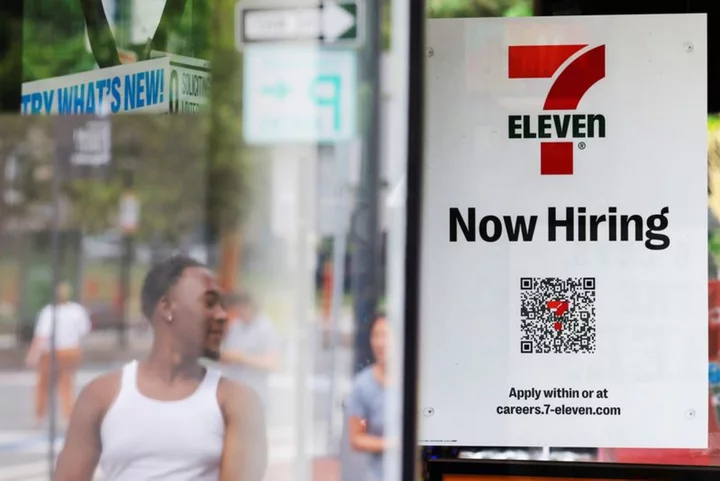U.S. job growth surged in September, suggesting that the labor market remains strong enough for the Federal Reserve to raise interest rates this year, though wage growth is moderating.
Nonfarm payrolls increased by 336,000 jobs last month, the Labor Department said in its closely watched employment report on Friday. Data for August was revised higher to show 227,000 jobs added instead of the previously reported 187,000.Economists polled by Reuters had forecast payrolls rising by 170,000 jobs. Estimates ranged from 90,000-256,000 jobs. The larger-than-expected increase was despite the tendency for the initial September payrolls print to be biased lower because of seasonal adjustment issues related to the return of education workers after the summer break.
MARKET REACTION:
STOCKS: S&P 500 futures fell and were last down 0.8%
BONDS: The yield on 10-year Treasury notes rose and was last 4.83%
FOREX: The dollar index gained 0.5% to 106.90
COMMENTS
MICHAEL BROWN, MARKET ANALYST, TRADER X, LONDON
"That certainly wasn't in the script with headline NFP smashing through all expectations. Must acknowledge however that unemployment & MoM earnings printing unchanged may take some of the shine off the headline number."
"Clearly the labor market remains resilient, and continues to impress, despite 500bp of tightening over the last 18 months."
"With markets now seeing another 25bp Fed hike by year-end as a roughly 50/50 chance, a hotter than expected CPI print next week could seal the deal for such a move to come in November, and spark the next leg of upside in the USD."
BRIAN JACOBSEN, CHIEF ECONOMIST, ANNEX WEALTH MANAGEMENT, MENOMONEE FALLS, WISCONSIN
“At least wage gains came in tepid. The rest was hot. The revisions to back months is shocking, showing the first print is grossly unreliable. If the Fed is data dependent, they’re flying with a broken instrument panel.”
HELEN GIVEN, FX TRADER, MONEX USA, WASHINGTON DC
"Reading the signs ahead of time the big indicator for this was JOLTS on Tuesday, posting another big upside surprise. I wouldn't be shocked if this crazy high figure gets revised down a little bit next month, but it's definitely a good sign for the US economy."
"Also important to note, average hourly earnings ticked down slightly and unemployment stayed level at 3.8%, so I'd hazard a guess the Fed is pretty pleased with this morning's release."
SIMON HARVEY, HEAD OF FX ANALYSIS, MONEX EUROPE, LONDON
"Today's monstrous payrolls print and the upwards revision to the August numbers once again highlights the difficulty in shorting the dollar in this macro environment."
"If it isn't risk conditions taking a beating from a sell-off in Treasuries, its the US exceptionalism narrative supporting the dollar."
"Given the strength in today's employment figures, markets can't fully discount the probability of a Fed hike in Q4, even as it coincided with weaker wage data. That's likely to keep the greenback supported, especially against rate sensitive currencies."
PETER CARDILLO, CHIEF MARKET ECONOMIST, SPARTAN CAPITAL SECURITIES, NEW YORK
“It’s quite a report. The topline number was much hotter than expected but hourly wages are cooling off nicely.”
“The main number is likely to be negative for the markets. Bottom line is, this puts in question whether or not the Fed stays on hold. But we do have inflation numbers next week.”
“The likelihood of a Fed hike in November has risen. This is not what the market was looking for.”
RICK MECKLER, PARTNER, CHERRY LANE INVESTMENTS, NEW VERNON, NEW JERSEY
"This market's current concern is interest rates more than anything else. Numbers that suggest higher-for-longer rates will be seen as negative for equities. Longer perspective, these rates will eventually slow for the economy and hurt employment. Just how far behind it will trail is the issue. At least for today investors are concerned that rates across the curve might move higher."
“We haven't found a bottom yet to the selloff (in the bond market). I'm not sure it makes a huge difference with the short-term rate hikes. We're coming to the end of short-term rate hikes probably either way - whether it's one more or not. The bigger concern is that as the yield curve steepens, if we start to have longer-term rates that are above these short term rates, it's going to have the same effect as if they did raise rates.”
"It's one of the problems in a managed economy that the Fed isn't necessarily able to dictate all the moves in the bond market. Their biggest control is really just on the front end."
(Compiled by the Global Breaking News Team)









